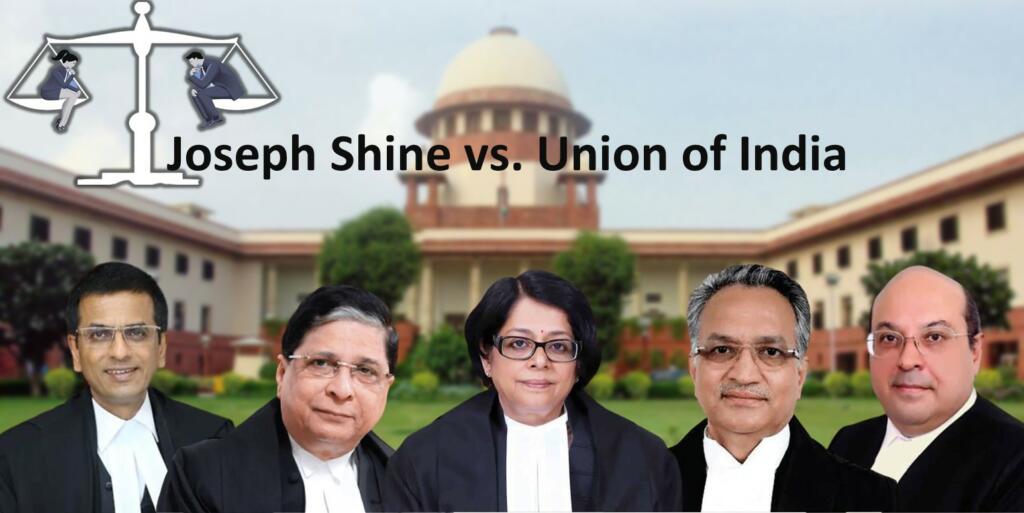Joseph Shine vs Union of India: Across societies, woman’s autonomy over their choice of partner has always been debated. Historically, women have always been subjugated and attributed as an agency of husband’s enterprise. In such a situation, where a prominent section is hindered from exercising the basic attributes of freedom in familial structures, the courts are expected to step in. The institution of marriage cannot be regarded as private spaces where constitutional rights are violated. To award immunity in circumstances where individual rights are under siege is against the basic premise of rule of law.
The Supreme Court in the 2018 judgment of Joseph Shine vs Union of India preserved the autonomy of an individual to make their choices with respect to their sexuality in the most intimate spaces of life. The court further protected the said right from public censures through criminal sanctions.
The unanimous judgment categorically struck down Section 497 Indian Penal Code, thereby decriminalizing adultery. The Bench comprising of Chief Justice Dipak Misra, Justice Khanwilkar, Justice Nariman, Justice Chandrachud, and Justice Indu Malhotra produced four concurring opinions.
Case Backdrop: Joseph Shine vs Union of India
In the year 2017, Joseph Shine, an Indian citizen residing in Italy, filed a petition in public interest under Article 32 of the Constitution. The petition challenged the constitutional validity of:
- Section 497 of the Indian Penal Code, 1860 which dealt with the criminal offense of adultery and;
- Section 198(2), Code of Criminal Procedure 1973 which provided that no person other than the husband of a person accused of adultery would be deemed to be aggrieved by the commission of an offense under Section 497 or Section 498 of the IPC.
The five-judge Constitution Bench on September 27th 2018, unanimously, in four concurring judgments, held that the law was archaic, arbitrary and paternalistic. It infringed upon a woman’s autonomy, dignity and privacy.
Question before the Supreme Court
The primary issue before the Apex Court in the matter was whether Section 497 of the IPC read with Section 198(2) of the CrPC violated Articles 14, 15 and 21 of the Constitution of India.
The fundamental hypothesis was that the choice of an intimate partner fell squarely within the area of autonomy over a person’s sexuality. This meant that each individual had an unfettered right to decide whether to engage in sexual intimacy outside his or her marital relationship or not. The embargo on the basis of marriage status was therefore, put to question.
Judgment: Man, not Master of Wife
The Constitutional Bench overruled several previous judgments upholding the criminalisation of adultery and struck down Section 497 of the IPC as unconstitutional. It violated the substantive equality clause under Articles 14, the non-discrimination provision of Article 15 and the constitutional guarantees of dignity, liberty, privacy and sexual autonomy under Article 21. The court further held that Section 198(2) of the CrPC was unconstitutional to the extent of its applicability to Section 497, IPC.
Further, the Bench held that the law resulted in the infringement of a woman’s right to life and personal liberty by espousing an idea of marriage that subverted true equality by applying penal sanctions to a gender-based approach to intimate relationships. The exaggerated focus on the aspect of connivance or consent of the husband translated to subordination of the woman.
The Court reaffirmed sexual privacy as a natural right under the Constitution. It provided that women are equal participants in a marriage and are capable of independently consenting to a sexual act in society as they are not a sexual property of their spouse.
Chief Justice Dipak Misra opined that treating adultery as a crime was an intrusion into the extreme privacy of the matrimonial sphere. Whereas, Justice D.Y. Chandrachud reiterated that the law supports misogyny and patriarchal notions of sexual control of a woman. He referred to the case of Navtej Singh Johar vs. Union of India and highlighted the indignity suffered by an individual when “acts within their personal sphere” are criminalised on the basis of regressive social attitudes.
On the other hand, Justice Indu Malhotra opined that adultery should remain a civil wrong as the freedom to have a consensual sexual relationship outside marriage by a married person did not warrant protection under Article 21.
Therefore, the judgment advocated gender neutrality in criminalization against the offense of adultery.
Support TFI:
Support us to strengthen the ‘Right’ ideology of cultural nationalism by purchasing the best quality garments from TFI-STORE.COM
Also Watch:
https://www.youtube.com/watch?v=gjQj-81ttuA
